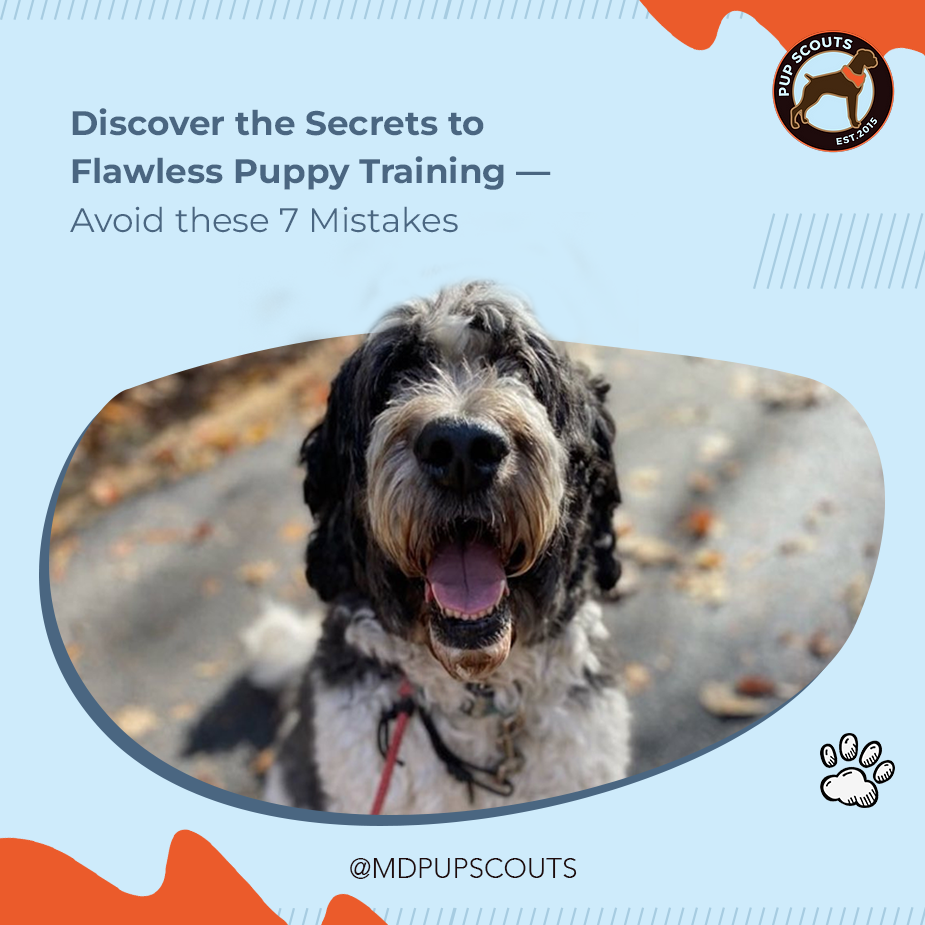7 Common Puppy Training Mistakes & How to Avoid Them

7 Puppy Training Pitfalls You Must Avoid
Dogs, the cute furry, adorable pals who love you to the moon and back! They bring so much love and companionship into our lives. But let’s face it, as much as we wish they could understand our every word; they need a little guidance to become the well-behaved companions we dream of. That’s where a professional puppy training service comes into play!
Puppy training can be bumpy, and even the most well-intentioned owners can stumble along the way. But lucky for you! We are here to help you avoid those common hiccups and master raising a pup like a true pro.
7 Common Puppy Training Mistakes You Must Avoid
Too Late to Start Puppy Training
Timing is everything, my friend! And when it comes to training your adorable pup, it’s no exception. If you wait too long to kickstart the training process, your furry companion might struggle to decode your commands.
While young puppies may not seem primed to master fancy tricks immediately, getting started with house training and basic commands is essential. It lays the foundation for a solid relationship with your four-legged buddy.
Nagging Your Pet with Repetition
Ah, the classic dog owner experience! We’ve all been there, haven’t we? When our furry friends fail to respond to our commands, we often find ourselves caught in a loop of repetition. “Come, come, come!” becomes our go-to mantra.
But hold your horses, my friend, because here’s the scoop—once is plenty. It’s crucial to grasp the importance of saying it just once. Trust me! Your pup got the message loud and clear the first time.
Remember, a single, confident command is all it takes to communicate with your pup. Keep it concise, keep it clear, and let the fun continue.
Not Enough Playtime for Your Pup
All work and no play make for a dull puppy! Try to incorporate regular play sessions into your training routine.
Engage in interactive games like fetch or hide-and-seek, which keep your pup physically active and strengthen your bond.
Remember, a tired pup is a well-behaved pup.
Inconsistent Response & Body Language
Consistency is the name of the game! Suppose you’re on the couch, enjoying a cozy evening with your furry friend by your side. But wait, wasn’t the couch supposed to be off-limits? Uh-oh, inconsistency strikes.
Consistency is the secret sauce to success, so be positive and stick to your guidelines. To avoid confusion, set clear rules and boundaries from the start. If you don’t want your pup on the furniture, resist those puppy-dog eyes every time.
Ignoring Socializing Needs
Life’s a party, and your pup wants an invite! Socialization is the key to raising a happy and well-adjusted doggo.
Make it a priority to introduce your pup to new experiences, furry pals, and friendly humans from an early age.
Go on adventures together, visit dog parks, and arrange puppy playdates. Remember, socialization isn’t just about building their confidence; it’s also about creating a lifetime of wonderful memories.
Punishing but Not Rewarding Enough
Who doesn’t love rewards? If you roll out punishment for every bad act, you must reward every good one. But sometimes, dog owners ignore the importance of a good reward.
Positive reinforcement is the secret ingredient in the recipe for successful puppy training. Instead of focusing solely on correcting naughty behaviors, channel your inner cheerleader and celebrate the good stuff!
Shower your pup with praise, belly rubs, and tasty treats when they do something right. With time, they’ll associate those positive vibes with the behaviors you want to see more of.
Inadequate Patience & Persistence
Rome was not built in a day! Similarly, puppy training takes time and dedication, my friend! It demands patience, persistence, and a positive attitude.
Keep going even if progress seems slow. Stay persistent, celebrate even the smallest achievements, and shower your furry friend with love throughout the journey. With your unwavering commitment and positive attitude, you’ll create an unbreakable bond and unlock the true potential of your pup.
Had enough of tirelessly typing “puppy training near me” and coming up short? Don’t worry! MD Pup Scouts has got you covered!
Our mission is to create an unbreakable bond between you and your furry friend that’ll make tails wag, and hearts leap!
We’re not just about teaching your pup a few tricks. Oh no, we go beyond that! At MD Pup Scouts, we empower you with the knowledge of dog psychology. With our superior puppy training service, you’ll unlock the secrets to understanding your canine companion on a whole new level.
So, grab your treat pouch, put on your happy face, and dive into the woof-tastic world of MD Pup Scouts‘ puppy training!

MD Pup Scouts Insider Tips for Flawless Puppy Training
Frequently Asked Questions
Q: What not to do when puppy training?
When it comes to puppy training, you should avoid a few things, such as:
- Don’t punish your puppy for accidents or mistakes
- Avoid inconsistent rules and commands, as this can confuse your puppy
- Refrain from overexposing your puppy to new experiences too quickly, as it may lead to fear or anxiety
- Don’t skip socialization
Avoiding these common mistakes can set your puppy up for successful training and a happy, well-adjusted life.
Q: How do you teach a puppy they are doing something wrong?
When teaching a puppy that they’re doing something wrong, it’s crucial to focus on positive reinforcement and redirection.
Instead of scolding or punishing, use a firm and clear “no” or “uh-uh” to interrupt the unwanted behavior. Immediately redirect their attention to a more appropriate activity or command, and reward them when they comply. Over time, the puppy will associate redirection and positive reinforcement with the undesired behavior, ultimately learning how to behave.
Q: How many minutes a day should you train your puppy?
A puppy’s ideal training duration varies depending on age, breed, and attention span.
Puppies have shorter attention spans. It helps them stay engaged and prevents them from becoming overwhelmed. So, breaking the training must be broken into smaller sessions of 5 to 10 minutes throughout the day.
Quality training that focuses on positive reinforcement and clear communication is more important than the duration of each session. Gradually increase the training time as your puppy grows older.
Q: What is the hardest age to train a puppy?
The hardest age to train a puppy is the adolescent stage, which typically occurs between 6 to 18 months. During this period, puppies experience hormonal changes and increased independence, leading to potential behavioral challenges. They may test boundaries, become easily distracted, and exhibit rebellious behavior.
However, with consistent and patient training, focusing on positive reinforcement and clear communication, you can navigate through this challenging phase and help your puppy develop into a well-behaved adult dog.
More to read in MD Pup Scouts Blog
7 Ways Hiring a Dog Walker or Pet Sitter can Make your Life Easier
8 Things You Can’t Afford to Overlook When Hiring a Professional Dog Walker


